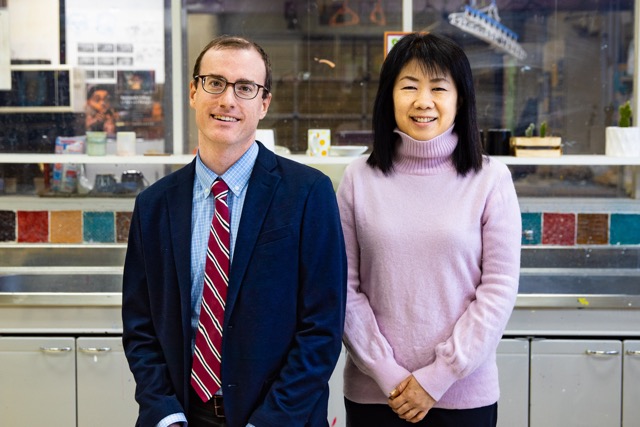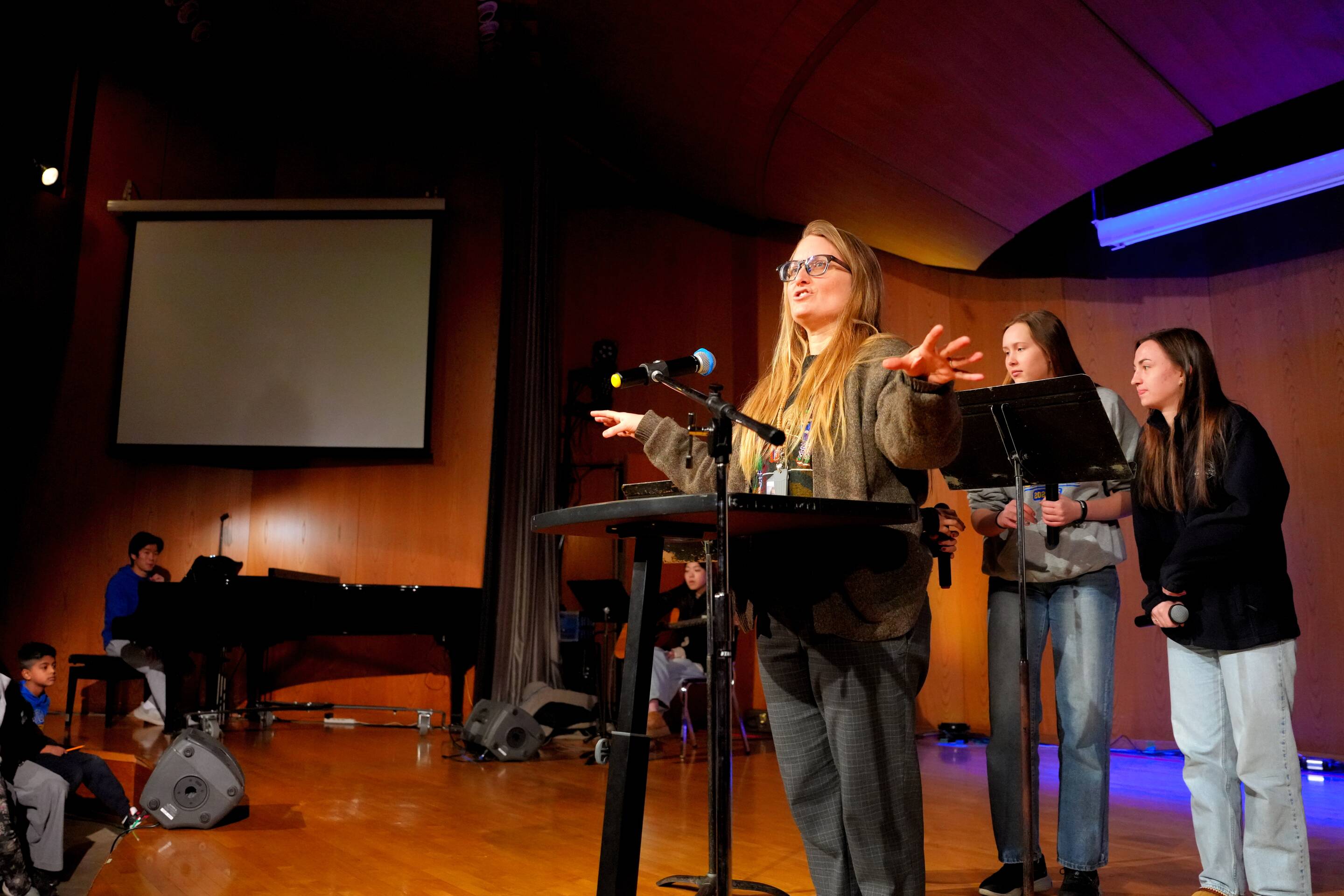Critical Thinking
At CAJ, we know it is important for students to learn facts and understand principles. Even more than acquiring knowledge, we want our students to be discerning and critical thinkers. We do this at every grade level, though these higher level thinking skills in first grade will look quite different than in high school.
We asked teachers what critical thinking looks like at each level at CAJ, and we heard some interesting descriptions. Some teachers in elementary school wrote:
"I love pushing the first graders to think critically in math. When we work on a problem and I see two students with different answers, I never tell them which one is right. Instead, I say, "I notice you have different answers. Can you talk together and see why your answers are different?" This then pushes them to have to explain their thinking and often leads one, or even both, students to have an "aha" moment when they see their mistake."
One elementary teacher described a recent lesson, where inviting students into a conversation prompted an explosion of new ideas:
"I always approach teaching as though my students are hearing the subject matter for the first time. For example, I asked some guiding questions about Good Friday, leading the class beyond what I assumed was common knowledge. Did it get them thinking? Oh, yes. But critical thinking almost always begins with healthy questioning."
Student 1: Mr. E, why is there a 'Special Day' on April 19th?
Teacher: Because it's Good Friday! Do you know why it’s called Good Friday?
Student 2: Because it’s before the weekend?
Teacher: No, because it's the day we remember when Jesus died. But, usually it’s not a good thing when someone dies so why do you think it was good?
Student 3: Oh, I know, because He lost our sins!
Teacher: Well, He didn't exactly lose them because that means we might find them again. He got rid of them completely!
Student 4: But, don't Christians still sometimes sin?
Teacher: Yes, but it’s kind of like a war. Sometimes the war is won but people still have to fight battles. Sometimes people lose the small battles but as long as they are on the winning side they have won the war. When Jesus died on the cross He won the war against sin.
Student 4: So, if we're on Jesus' side then we are on the winning side?
Teacher: That's right! But even though the war is won sometimes people are still fighting battles because they think the war isn't won. They haven't heard yet.
Student 5: That's sad.
Critical thinking does not only happen in Bible class, though often seeing biblical principles in surprising places are part of making important connections. A middle school teacher described:
"I witnessed students thinking critically when subject content overlaps. For example, we were studying Egyptian gods in social studies and Moses in Bible class. During a video in Bible class the host talked about the Egyptian gods and what people believed and how God's power was far superior than any of their "gods." The students responded and talked about the links between the two contents and asked thought provoking questions. I think that when students are asking complex questions, wondering about the answers, and seeking those answers is when we, as educators, can see students thinking critically."
High school is where we see critical thinking maturing. One teacher wrote:
"Through debates, students in high school show critical thinking in two ways. First, by arguing for an assigned position on a difficult or controversial topic, they learn to understand issues from multiple perspectives (including perspectives they might not share themselves). Then, by explaining their own personal position after the formal debate is over, they practice clarifying their own beliefs through the arguments they have expressed or heard."
Even outside the classroom, we see evidence of critical thinking. A counselor reflected:
"As a counselor, I get to witness our students' self-exploration through meta-cognition, thinking about our own thinking. When we examine what we say to ourselves and what we believe about ourselves, about God, and about the world around us, we can make room for truth, change and growth."
We believe that part of equipping students to serve Japan and the world for Christ includes training students to ask question, to think critically, to explore issues, see multiple perspectives, to know thinking strategies, and to see connections. We are pleased and grateful to see evidence of this happening in all levels and in many ways at CAJ.

クリティカルな思考
生徒が真実を学び、原則を理解することはとても大切なことだとCAJは考えます。知識を詰め込むことよりも、物事を見分ける力、さらにはクリティカルに物事を捉える力を得て欲しいと願っています。全学年に渡ってこのような教育をしていますが、小学生と高校生では教え方に違いがあるのは当然のことです。
クリティカルな思考を具体的にどう教えるか、各学年の教師に尋ねたところ、興味深い答えが返ってきました。
以下は初等部の教師からの回答です。
1年生の算数の時間に、クリティカルに考えるように一生懸命教えていますが、とても楽しいです。同じ問題から二人の児童が違う答えを出したとします。私は、どちらが正しいとは言うことはせず、その代わりにこう尋ねます。「二つの違う答えが出てきたけど、なぜ答えが違うのか二人で考えて見て。」すると二人は、それぞれの考え方を説明し始めます。その結果一人が、時には両方が、「なるほど!」とひらめいて、なぜ間違ったかに気づきます。
もう一人の初等部の教師が、最近教室であった事を話してくれました。児童たちと話し合いの場を思っていたところ、思いがけなくも色々な話題に話が弾んだそうです。
教える時に気をつけていることがあります。それはいつも、児童は初めて耳にすることだ、という前提で語りかけることです。例えば、キリストの受難日である「Good Friday」。児童はこの日の意味をよく知っているはずですが、改めて聞いて見ました。すると色々な質問が出てきました。クリティカルな思考は、正当な疑問を持つことから生まれます。
児童1:E先生、どうして4月19日は「特別な日」なんですか?
先生:それはその日が受難日だからだよ!なぜ「Good Friday」という名前がついているか知ってる?
児童2:週末の1日前だから?
先生:違うよ。それは、イエス様が死んでくださった日を、私たちが忘れないように、呼び名をつけているんだよ。でも、普通、誰かが死んでしまったのなら、それは良くないことなのに、なぜ「good」と言うのかな?
児童3:あ!わかります!イエス様が私たちの罪を失くしてくれたから!
先生:失くした、と言うのはちょっと違うかな。失くした、と言ってしまうと、また見つけるかもしれないからね。イエス様は、私たちの罪を完全に取り去ってくださったんだね!
児童4:でも、クリスチャンでも時々罪をおかすことがあるでしょう?
先生:そうだね、でも、戦争みたいなものかな。たとえ戦争に勝利しても、まだ小さな戦いが続くことがあるよね。小さな戦いに負けることがあっても、戦争に勝利していれば、勝っているわけだよね?イエス様が十字架の上で死んでくださったとき、イエス様が戦争に対して勝利をおさめてくださったんだね。
児童4:てことは、僕たちがイエス様と一緒にいれば、勝っているってこと?
先生:その通り!でもね、もう戦争に勝利しているのに、それを知らない人たちが今でも戦いを続けているんだよ。まだ勝利のことを聞いたことがないんだね。
児童3:それは悲しいな。
聖書の授業の時だけ、クリティカルな考え方をしているわけではありません。とは言え、聖書的な原則を思いもつかないところで発見すると、大切なことが色々とつながっていきます。中等部の先生が、こんなことを書いてくれました。
異なる科目の授業で、教わる内容が重なっていると、生徒たちがクリティカルに考えていることに気づかされることがあります。例えば、社会科の授業でエジプトの神々のことを学習していたときに、聖書の授業でモーセのことを学んでいました。聖書の授業で紹介されたビデオでは、生徒たちはエジプトの神々について聞き、当時の人々が何を信じていたか、また聖書の神がエジブトの「神々」よりもどれほど優れていたか、ということを教えられました。生徒たちは、二つの科目で教えられたことをつなぎ合わせて、示唆に富む質問を投げかけていました。込み入った質問をしたり、深く考えたり、なんとか答えを探り出そうとしたりする姿勢から、私たち教師は生徒たちがクリティカルに考えていることがわかるのです。
高校生になると、クリティカルな考え方はますます進んでいきます。ある教師はこう話してくれました。
ディベートという手段を通して、高校生たちはクリティカルな思考を二段階で身につけます。まず教師が、賛否両論ある難しい課題を選んで、それに関する意見や立場を決めて、生徒たちに割り当てます。立場を割り当てられた生徒たちは、ディベートをすることにより、様々な立場の視点を検討し理解し始めます。(自分が同意しない立場を含めてです。)これが第一段階です。次に、ディベートが終了すると、自分が述べた意見や耳にした立場を吟味して、自分の考えをより明確にしていきます。これが第二段階です。
教室を出てからでも、クリティカル思考は実践されています。カウンセラーの一人がこう教えてくれました。
メタ認識-自身の思考を思考する手段を通じて、生徒たちが自己を探求している姿を、カウンセラーとして目にすることがあります。自己表現、自己信条、神観、世界観を吟味することで、人は真実、変化、成長へと目を向けるのです。
日本と世界でキリストに仕える生徒を育成するとは、次のような分野の訓練を含むと考えます。児童生徒に疑問を投げかけること。クリティカル思考をすること。課題を探求すること。多岐に渡る視点で物事を捉えること。戦略を考え、事柄の関連性を見極めること。CAJではこれらのことが、すべての学年の多種多様な教育場面で見られています。それはとても喜ばしいこと、また感謝なことだと思っています。

Academic Guidance at CAJ
An important part of equipping students to serve Japan and the world for Christ is helping students plan wisely for life after graduation. CAJ’s academic counselors, Tom McGlothlin and Nobuko Mori, work with students throughout high school to assist them in this planning.
As Christians, we believe that God’s calling for all of our students is ultimately the same: to love God and neighbor. Nevertheless, we also believe that God has already equipped each student with strengths and interests, and we seek to help students explore ways they might further develop and use those strengths and interests to love God and neighbor. To this end, students have begun using tools included in our new online guidance platform, MaiaLearning, to discern their strengths and interests and explore future careers that might fit those well.
CAJ students choose many different paths after graduation, and we support all of them as they discern their next steps. Most CAJ students, however, choose to continue their education at the university level. We work with these students and their families to help them find good university options worldwide, and we assist them through the application process from start to finish.

CAJのアカデミックガイダンス
日本と世界でキリストに仕える生徒を育成するためには、生徒たちが卒業後も賢明に生きていけるように手助けすることが重要です。CAJのアカデミックカウンセラーのトム・マックグロスリンと森伸子は、高校生たちに将来の進路選択の補助をする仕事をしています。
私たちはクリスチャンとして、すべての生徒に与えられる神さまからの使命は、究極的には同じだと信じます。それは神と隣人を愛することです。とは言え、一人ひとりには神さまから与えられた長所があり、関心事があるということも信じています。ですから私たちは、生徒たちの強みや関心事をさらに伸ばしていって、一人ひとりが自分の力量を最大限生かすことで、神と隣人を愛せるように支援します。そのために、新しいガイダンスのオンラインツールである「MaiaLearning」を生徒は使い始めました。自分にはどこに長所があるのか、関心があることは何なのか、それらを自分で見出して、自分にあった将来の計画を立てていきます。
CAJの生徒たちが選ぶ卒業後の進路は様々です。次のステップを見極めようと真剣に取り組む全ての生徒を、私たちは支援します。ほとんどのCAJの生徒は、卒業後、大学水準での教育を受けることを志願して進学します。ですから、私たちは生徒とご家族と一緒になって、世界中の大学の中から、本人にあった大学を見つけるまで、最初の段階から最終段階まで協働作業しています。





